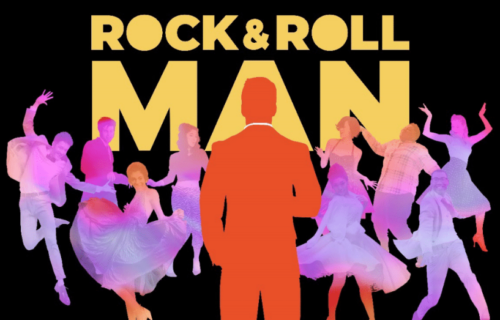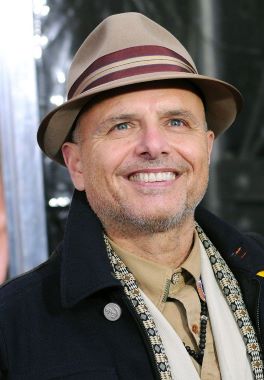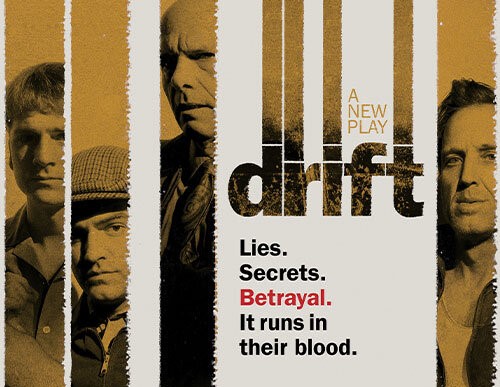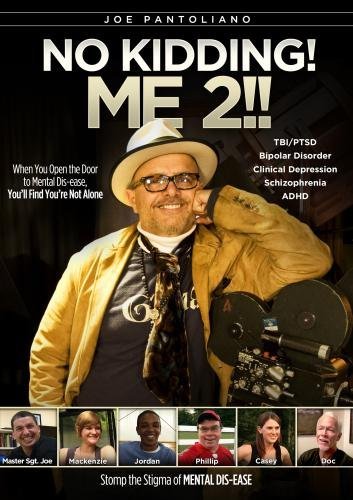AN ACTOR WHO WILL CHARM
THE JOEY PANTS OFF YOU
Joe Pantoliano, affectionately nicknamed Joey Pants, has a recognizable face and voice from decades of TV and film — too many to mention, but perhaps the most notable include The Goonies, La Bamba, Empire of the Sun, Midnight Run, The Fugitive, Bad Boys, Bound, U.S. Marshalls, The Matrix, and Memento. He won an Emmy for his portrayal of Ralph Cifaretto in The Sopranos, and from 2015 to 2018 he played Michael Gorski in the Netflix series Sense8.
As a published author, his two memoirs are Who’s Sorry Now: The True Story of a Stand-Up Guy, and Asylum: Hollywood Tales From My Great Depression: Brain Dis-Ease, Recovery and Being My Mother’s Son. In 2009, he directed, wrote, and starred in the documentary No Kidding! Me 2!
Currently, he’s co-starring in the Off-Broadway musical Rock & Roll Man at New World Stages (with co-star Constantine Maroulis). Stage and Cinema’s Gregory Fletcher spoke with him about opening in his first musical.
 GREGORY FLETCHER: I love how versatile you get to be onstage playing two characters. Morris Levy is gangster tough and ruthless, yet funny. Whereas Leo Mintz tries to be funny, but isn’t, which is funny in itself; also he’s kind, passionate, and supportive. Plus, both sing, and I even caught a little choreography here and there. How is this your first musical?
GREGORY FLETCHER: I love how versatile you get to be onstage playing two characters. Morris Levy is gangster tough and ruthless, yet funny. Whereas Leo Mintz tries to be funny, but isn’t, which is funny in itself; also he’s kind, passionate, and supportive. Plus, both sing, and I even caught a little choreography here and there. How is this your first musical?
JOEY PANTOLIANO: In high school, I always loved singing in the choir — I was a second tenor. I even trained here in New York to sing, but when it came to singing solo and auditioning for musicals, I was just such a chicken shit. I tried, but … once, I went to a musical audition for The Me Nobody Knows [which later debuted Off-Broadway in 1970 before transferring to Broadway]. I just saw it listed in the paper Backstage and showed up. When it was my turn, I walked in and stood there. I didn’t know what I was doing. The guy at a piano asked to hear a song. I said, “I don’t have a song.” He said, “Sing Happy Birthday.” And before I finished, he said, “Thank you.” And that was it.
FLETCHER: Lucky for us, that experience didn’t discourage you. Where did you study acting?
JOEY PANTS: At HB Studio [one of the original acting studios in NYC] while in my last year of high school.
FLETCHER: You studied with Uta Hagen?
JOEY: With her husband, Herbert Berghoff.
FLETCHER: Just as impressive. The B in HB.
Joe Pantoliano, Alex Mickiewicz in Drift (Edward T Morris)
JOEY: After graduating, I supported myself for seven years waiting tables in New York City. Besides studying acting, I got my training doing Equity Waiver Off-Off Broadway. Back then, they could work you for free. You had limited rehearsal time, and you got like 14 or 16 performances to showcase your work. Oh God, I must’ve done dozens of these showcase plays. Later, I got paid. I was in the original production of Orphans by Lyle Kessler, and John Patrick Shanley’s Italian American Reconciliation. I did Frankie and Johnny in the Clair de Lune on Broadway with Rosie Perez in 2003 [replacing Stanley Tucci]. And I was actually in the theater across the hall from Rock & Roll Man when COVID shut everything down. It was only our 14th preview performance for the play Drift, directed by Bobby Moresco.
FLETCHER: What took you away from NYC and theater in those early days? I’m guessing it was TV and film, but how did that come about?
JOEY: I couldn’t get arrested in New York. I auditioned a lot but lost out to everyone who said they went to Yale. It felt like I was up against a theatrical college mafia. And I was. During which time, many of my fellow classmates from acting class were moving to LA and getting cast. I started seeing them on episodes of The Streets of San Francisco, The Rockford Files, and Kojak, and all the other cop shows on in those days, and I thought if they can get on television, then so can I. My girlfriend, at the time, we saved $1500 each and went to LA and set up house. We bought a ’69 station wagon with 60,000 miles on it for $600. Eventually, I started booking jobs. I was 24-25 years old and finally started making a living.
"Buckle your seatbelt, Dorothy, cuz Kansas is going bye-bye." Joe Pantoliano as Cypher in The Matrix (1999)
FLETCHER: And you went on to do hundreds of jobs in TV and film, with occasional theater here and there. Now, you’re back on the boards doing your first musical. How has Rock & Roll Man challenged you?
JOEY: Oh gosh, just staying awake for starters. It’s a hard job. You know, it’s concentrated focus and energy. People say, “Gee, how easy, you’re only working a couple hours a day.” But the concentration and the movement continue for six days a week. It’s incredibly challenging. And fun, too.
FLETCHER: It’s a grueling schedule to say the least. After one off day a week, on Tuesday, you return on Wednesday for a matinee and evening performance. On Thursday and Friday, you have an evening performance, followed by another two-show day on Saturday, and then a matinee on Sunday and an evening show on Monday. Are you living in the city or back to your native New Jersey?
The Cast of Rock & Roll Man ( ©Joan Marcus, 2023)
JOEY: My wife and I have a place here in the city. We have a home in Connecticut, but I haven’t been there in two months. We rehearsed for six weeks, and during preview performances, we rehearsed by day and made all sorts of changes that were put in at night. At our third preview, the show was running two hours and 20 minutes. They cut three or four songs and lots of exposition dialogue that was slowing things down. In any creative process, especially in movies, when you’re editing, you get to the point. It’s a time when you start murdering your babies — cutting stuff you absolutely adore, but you do it for the benefit of the whole show.
FLETCHER: You play two characters in the musical: Leo Mintz and Morris Levy, both real people in the life of Alan Freed. Were you aware of either one of these men prior to casting?
Joe Pantoliano as Leo Mintz, Constantine Maroulis as Alan Freed, and the cast of Rock & Roll Man ( ©Joan Marcus, 2023)
JOEY: No. I knew of Alan Freed and saw most of his rock & roll movies, [Don’t Knock the Rock (1956), Rock Around the Clock (1956), Mister Rock and Roll (1957), Go, Johnny, Go! (1959)]. Also, the movies about him in the 80s. And movies that used his work. [The T.A.M.I. Show (1964), Two-Lane Blacktop (1971), Come Back to the 5 & Dime, Jimmy Dean, Jimmy Dean (1983), Porky’s II (1983), etc.] I remember going to Alan Freed’s rock & roll revivals where I saw Little Richard, Bo Diddley, and Chuck Berry. They were doing them all over the country at that time. I think I was working in Chicago, and I went with a bunch of friends, and it was thrilling. I was born in ’˜51, so by the time I was getting into music, it was more Motown and then The Beatles. But prior to that, it was all Alan Freed.
FLETCHER: Being born and raised in Hoboken, New Jersey, right across the Hudson River, did theater play a big role in your upbringing?
JOEY: Movies played a bigger part. And my mother’s 12-inch black-and-white television. When I was in high school, they put us on a bus and drove us through the Lincoln Tunnel. We saw a production of Othello with Brock Peters, and that was the first time I ever saw a Broadway show. The second time, I went on a date with a girl and took her to the musical Man of La Mancha. That was amazing. I saw Yaphet Kotto in The Great White Hope, and Jimmy Stewart in Harvey, but the performance of my lifetime that has stayed with me for my entire life was Cliff Gorman in Lenny. I saw it twice and second acted it seven times. I was a broke student of acting. I second acted Richard Burton in Equus. I got to see Anthony Hopkins during previews, and I saw Anthony Perkins, too. What I found interesting in terms of performance — I thought Richard Burton was somewhat wooden, but I’d never seen such charisma onstage before. I mean, it was like he had a light inside of him. You couldn’t take your eyes off the guy.
Richard Burton in Equus, 1974 (Image courtesy mptvimages.com)
FLETCHER: It must’ve been an amazing time to be in New York.
JOEY: The lifestyle living in New York then was way different than today. I was living in the West Village on Sullivan Street paying $110 for a month’s rent in a four-room apartment. I was making $30 or $40 a shift waiting tables, so I only had to work 20 hours a week to pay my bills. The rest I saved in the bank. Today, many of the young performers in Rock & Roll Man rush out to catch the last train to Jersey or Long Island, and with the cost of bills today, it’s become unattainable for a lot of people. Also, the post-show camaraderie is different, too. Where are the affordable bars? When I was starting out, we had the Colonnades downtown and the Columbus Bar. Also, Jimmy Rays and Joe Allen were always attainable for young performers starting out. And Charlie’s — all these bars where you could go and have a white wine spritzer or a beer for a dollar. Today, it’s just no longer attainable. Such camaraderie is just financially out of reach for a lot of these kids. And that was part of the great fun for me. Of course, being in a show — that backstage life, that atmosphere still exists. Half hour calls and being a part of the backstage routine and being onstage in front of a live audience — it’s marvelous and makes me feel young.
June 21, 2023: Joe Pantoliano, Rock & Roll Man Opening Night (Arturo Holmes/Getty Images)
FLETCHER: I loved how the two characters you play are completely separate entities. I know the costumes and the wig help you clearly define the two characters, but also your spirit of the two are so different.
JOEY: Well, when building a character, it helps that the two are very yin and yang, good and evil. But I wanted to build a character that made them separate’”completely different from one another. In broad generalities, broad strokes, Morris Levy was only interested in the money. Also, he had impeccable taste, and the catalog of artists he managed, he had some really talented people, but he was all about the money and protecting his interests. Leo Mintz probably was in it for the money, too — I mean, it was a great way to make money, but in contrast I wanted him to be nebbish. I gave him an anxiety disorder and nervous tension and a big heart. But it wasn’t until I started wardrobe fittings with our costume designer Leon [Dobkowski] that I discovered he should be really wrinkly. When I take off his clothes, I fold them on my chair and leave them in a ball over night. Then during an early preview, I was looking in the mirror and seeing Leo’s reflection, and I thought about The Three Stooges. Remember how Larry teased out his hair on the sides and was bald on top? I borrowed some hair gel and started teasing it out, and that’s how I came up with that look.
FLETCHER: I think your two characters are so complete that you’re unrecognizable. If someone didn’t know you, they could easily think two different actors were playing those roles.
JOEY: Thank you, I think that’s the highest compliment. I’ve heard that from others, too. They didn’t realize I was playing both. I can’t get any better of a compliment than that.
Constantine Maroulis and Joe Pantoliano (Constantine Maroulis)
FLETCHER: I know the production has had at least two former productions at regional theaters, as well as a couple workshops. Were you involved with any of those?
JOEY: No. A few of the cast members were involved, but they weren’t sticking to any of the other stuff they did. And Stephanie [Klemons], our choreographer extraordinaire, I mean it, she’s a genius. She didn’t want to retread any of the old stuff, so she created all new stuff that was new to everybody.
FLETCHER: It looks to me from the size of the cast and how big the show is that someone’s hoping to move it to Broadway. Any confirmations?
JOEY: It wouldn’t surprise me if that’s what some people wanted, but when you consider you’re getting a Broadway production for the price of an Off-Broadway ticket, that’s amazing, right? The production values are extraordinary. And the intimacy of it is also very special. Moving it to Broadway, wouldn’t you lose that intimacy?
FLETCHER: But with what intimacy you lose, the paycheck and profits you gain. And what with the Broadway successes of Tina, Cher, Donna, the Temptations, the Jersey Boys and more, why not add Alan Freed and all the wonderful singers and music he promoted? Either way, I’m expecting a long run. What’s the longest run you’ve ever done?
JOEY: Not long. Like 12 or 13 weeks. I’m guessing this may turn out to be my longest run, but, you know, I don’t think in those terms. I never plan that far in advance.
Joe Pantoliano, Devon Gearhart and Marcia Gay Harden portray a family caught up in the turmoil of mental illness in Canvas
FLETCHER: I read in your bio that you founded an organization called No Kidding, Me Too. The mission is to remove the stigma of brain disease.
JOEY: Yeah, I did a movie called Canvas [2006] that I produced and acted in. Joe Greco wrote and directed it, which was based on his life growing up with a mom who was schizophrenic. Marcia Gay Harden played my wife, and when she showed up and started playing the part, there was an uncanny resemblance to somebody in my life. It was like I was having déjà vu, and I realized it was my mom. By the time I was done working on it, a lot of people in the crew were asking me questions about scenes in the movie whereupon the Baker Act got introduced into the state of California. If you are presumed by the police that you’re a danger to yourself or others, they can actually arrest you and put you under observation for 48 hours. And it was at this point that I realized that’¦well, my mom was Italian American’”I didn’t think she was crazy. But then I realized that there was more to her than met the eye. Her behavior was not willful, but also, I was having a nervous breakdown and didn’t know it.
The discrimination I experienced once I was diagnosed — it pissed me off, and I thought people needed to know about it. Everyone was coming up to me and saying, “No kidding, me too. No kidding, I’m bipolar, no kidding, me too.” So, I made a documentary, No Kidding? Me 2! [2009] The organization [No Kidding? Me Too!] became the obliteration of the shame and discrimination that is affected with brain disease. Why is it the brain is discriminated against? Why is it that you can have heart disease, but you’re penalized if it’s a brain disease? Why is it that you can get full coverage on the removal of a gallbladder that doesn’t even have a function any longer, but not with the brain? It’s fascinating to me. Apparently, in order to be a performer, you need a lot of traumas in your life. I’ve been treating my trauma, my disease, with creativity. I go to the theater every night and I’m surrounded by bold misfits in all of us. Most of us are not able to fit into society, but somehow the creative arts save us from ourselves. I’ve been talking about it and saying, “I’m in recovery from mental disease” ever since Canvas was released.
FLETCHER: The creative arts are enriching and saves many of us from all sorts of things we can’t even comprehend’”yes, I think that discovery is true and relevant. A Godsend.
JOEY: Creativity has helped keep me on a path of recovery, which is a wonderful thing for all of us. How lucky we are.
Sally Field presented with the 1st Hope Award
To donate and/or learn more about “No Kidding, Me Too!” visit NKM2
follow Joe Pantoliano on Instagram @realjoeypants
RockAndRollManTheMusical.com or follow @rockrollmanshow
find Gregory Fletcher at Gregory Fletcher, Facebook, and Instagram



